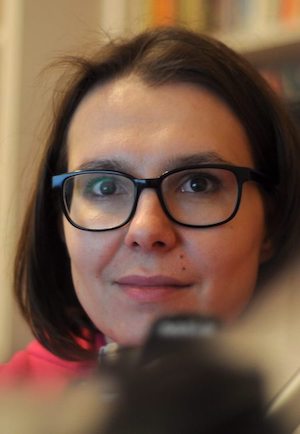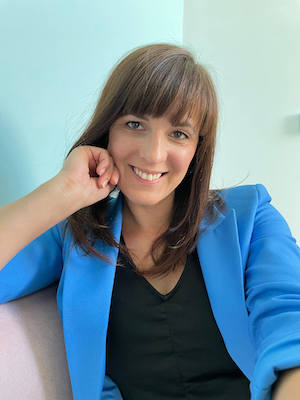POSTED ON 30 JUN 2022
READING TIME: 8 MINUTES
Women in tech: 3 engineers offer advice to the next generation (Part 2)
Last week, we spoke with four Sonalakers to learn what first inspired them to become engineers and to hear what advice they’d offer anyone seeking to carve out a career in software engineering.
In this post, we chat with Alicja, Charlotte and Zuzanka to get their thoughts on what it takes to be a successful engineer, taking time to find a career that you love, and why everything looks like a nail when you only have a hammer!
Małgorzata ‘Zuzanka’ Krzyżaniak, Project Manager
What inspired you to get into engineering?

I got my first computer when I was 16 or 17. It was a simple IBM XT with an amber screen and no harddrive. I think I was just amazed. It was like a TV set but you could do things with it. I was just wildly interested in what you could do and how it worked.
When I started studying computer science, I was not really interested until I stumbled upon anything that was network related. That was the moment when everything clicked. I was very curious about how this could be used and how information could be spread. That was the moment.
What’s the most satisfying thing about your job?
For me, I’m happy to solve issues. My work is mostly about asking questions. What I find most satisfying is to ask the right questions and to help people to solve the issues that they thought were unsolvable. I really like to empower people to achieve their goals.
What skills do you need to be a good engineer?
You need to be curious. You need to ask questions over and over again. Is it the right way to do it? If you talk to someone, maybe their experience will give you a different perspective. You shouldn’t take things for granted.
Sometimes it’s easy. Sometimes everything you do seems wrong and everything seems hard. I always say that computer programming is not open heart surgery. You can make mistakes and learn from them.
Don’t be ashamed if you don’t know something because you cannot know everything. With that mindset – curiosity, courage, being open to failure, being precise and persistent – this is the way that you can be successful in software engineering.
What advice would you give someone who’s looking to get into engineering?
Currently, it’s quite easy to find tools to learn, tutorials, or courses without even leaving your home. You can get a full toolset that allows you to start working in engineering, sometimes for free.
I believe you will be a better programmer or software engineer if you take a more structured or academic approach to software development. I think it’s valuable to spend at least two or three years on any organised course to develop the right mindset – how to find information, how to understand what tools you need.
There’s a saying that if you only have a hammer, everything looks like a nail. This is absolutely the opposite of being an engineer. Studying engineering or computer science or software development or whatever you choose will give you the tools you need.
Charlotte Fawsitt, Software Engineer
What inspired you to become a software engineer?

There was no real epiphany moment. When I finished school, I worked in retail for about five years – I didn’t really know what I wanted to do.
After a couple of years, I thought ‘Well, I really like computers.’ I was able to build computers, fix laptops and that sort of thing. So I looked into an information technology course just to see what I thought of it. I did some Python, Visual Basic and I started to really enjoy it. So I pursued that further until I got my degree and thought ‘This is definitely what I want to do.’
What’s the most satisfying thing about being an engineer?
I enjoy seeing the finished product, how it all came together to be a final, usable product. Struggling through all the bugs and the ‘Why isn’t this working?’ to see it all in action.
What skills do you need to be a good engineer?
You definitely need focus. For me, I’ve a very technical mind. I think you have to be mechanically minded. You have to work logically. You definitely have to be methodical about it.
I wouldn’t say you need to have a natural aptitude but you have to be somewhat interested in it. If you’re not interested in it, you won’t go far because you’ll get bored very quickly.
What advice would you give someone who’s looking to get into engineering?
I think early on, try anything you can. Try to get a broad range but then try to figure out what area you want to be in, whether you want to be in frontend, backend, or you want to do everything, which is fine. There are full stacks out there.
You don’t want to go too long without knowing where you want to end up developing. I definitely think by the final year of college, you should have some sort of inclination towards what you want to do.
Don’t be intimidated going into a company where there are not many women. Go for it. Don’t let that stop you going anywhere you want to go. If you think the company looks cool but there’s only a handful of women in it, just go for it anyway. You’ll enjoy it regardless.
Alicja Pudlik, Team Leader, Full Stack Engineer
What inspired you to get into engineering?

It was a sort of coincidence. I remember it was a problem for me to choose what to study, which path to take. I was pretty good at math, sports, painting, and enjoyed solving problems, even after school. So I was looking for a field which would be a practical application of logic and mathematics.
When I was deciding on my path, I interviewed some people who had already started studying computer science and I asked how it is, what don’t you like? They said there were far too many mathematical subjects, which was a downside for them but a huge plus for me.
I didn’t get a chance to do programming during high school so I needed to learn all of that. If a university taught me how to program from the very beginning, it was something for me. Computer Science was my choice. I never regretted it.
What’s the most satisfying thing about your job?
Designing solutions. The moment when you actually solve an issue, or develop something, when it starts working and it works well.
Also, in my current leader role, it’s very satisfying when a teammate has some success. It makes me proud when a team member grows, and becomes a really meaningful part of the team. This is great.
What skills do you need to be a good engineer?
You need to be a bit stubborn because a lot of the everyday obstacles you’ll face are hard to overcome. Most of our days are spent struggling with something.
You need to set something up. It doesn’t work and you don’t know why. You need to collect requirements, some business knowledge, and details of existing solutions. You often need to ask who to ask! You provide changes and your thing still doesn’t work. At the end sometimes it’s just a detail like a single dot. But you get great satisfaction if you go through all of this and get it to work.
You need to know how to stay concentrated for a longer period of time. You need to keep learning, be precise and efficient.
It’s good to get on well with people. Communication is very important. Sometimes people may not be very open in this area. Don’t judge them too quickly. Once you get past the surface, you find them wonderful.
I believe a good leader mostly takes care of team members, supports their growth. Being empathic and understanding helps.
What advice would you give someone who’s looking to get into engineering?
Don’t hesitate. The people are amazing and the job is great. There could be different projects and there may be something which is not nice for you on a day-to-day basis but a lot of the inconveniences are changeable if you fight for improvements.
There are still more men than women in this industry. If you are scared of that, know that it’s already changing. When I was studying, only six or seven out of 100 people were girls. Currently, about 18% of IT students are women.
The working hours are flexible – take advantage of that. I like gardening, travelling, and I’m a mother. So I don’t work on Wednesdays and I mostly work remotely. Find your own workstyle, giving you the comfort you need.
If you missed the opening part of our series, don’t forget to read our first Women in Tech post.
Supporting the next generation
We believe in giving everyone access to education and technology. That’s why we actively support the work of Kinia. This non-profit organisation works with young people from less advantaged backgrounds and offers them access to digital tools, training and development opportunities.
We’re hiring
If you’re interested in a career as an engineer or currently looking for work in this area, we’re always looking for emerging talent. Check out our careers page to find out more about our current vacancies and what we have to offer.